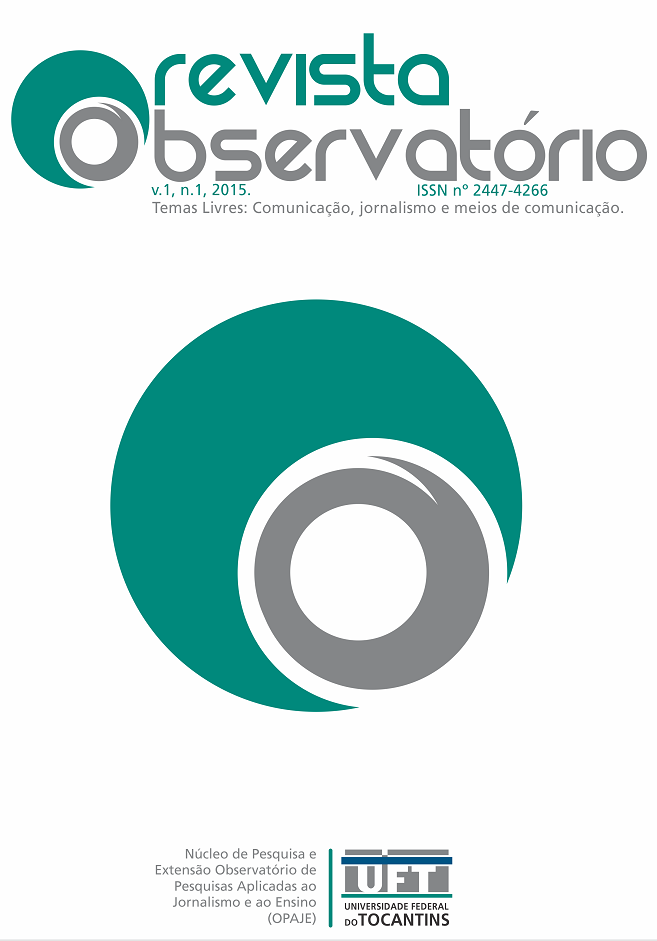Magic Lantern: the Llghts in journalism José Liberato ( 1813 - 1821 )
DOI:
https://doi.org/10.20873/uft.2447-4266.2015v1n1p103Keywords:
History of journalism, Enlightenment, Political utopia, José Liberato, O InvestigadorAbstract
The Enlightenment implies that human education, escaping the control of ecclesiastical and political authorities, would make possible unrestricted access to rational thought. One of the communication tools of the Enlightenment pedagogy were the newspapers, considered a regular letter among men of letters gradually being designed to broader segments of the population. Among the most important representatives of the Enlightenment in Portugal is the journalist José Liberato, author of two newspapers published in London between 1813 and 1821. The author understood their role to introduce the Portuguese in the Age of Reason and is imbued-in a pedagogy that respected both religion and the monarchy. The purpose of this article is to investigate the literate ideals of Liberato, his pedagogical proposal and, most importantly, how his journalistic exercise built a dedicated utopia to think the Portuguese future.
Downloads
References
Referências
Correio Braziliense ou Armazém Literário. Hipólito José da Costa. Londres: W. Lewis.1808-1822.
DARNTON, Robert. Os dentes falsos de George Washington: um guia não convencional para o século XVIII. São Paulo: Companhia das Letras, 2005.
LUSTOSA, Isabel. Insultos impressos. A guerra dos jornalistas na Independência (1821-1823). São Paulo: Cia das Letras, 2000.
MACHADO, Adelaide Maria Muralha Vieira. A Importância de se chamar português: José Liberato Freire de Carvalho na direção do Investigador Português em Inglaterra, 1814-1819.Tese de Doutorado apresentada ao Centro de História da Cultura em Portugal. Abril de 2011.
MERCIER, Louis-Sebastien. L'an deux Mille quatre cent quarante, revê s'il en fût jamais. Paris, 1773. Disponível em: https://play.google.com/books/ Acesso em Maio/2015.
NEVES, Lúcia Maria Bastos. Corcundas e Constitucionais. A cultura política na independência (1820 - 1822). Rio de Janeiro: Revan, 2003.
O Campeão, José Liberato Freire de Carvalho, Londres, 1819-1821.
O Investigador Portuguez em Inglaterra ou Jornal Literário, Politico, etc. Bernardo José de Abrantes e Castro, Vicente Pedro Nolasco da Cunha, Miguel Caetano de Castro e José Liberato Freire de Carvalho. Londres, 1811-1819.
REIS, José Eduardo. "A literatura e a ideia do mundo ideal: relatório de um programa para a disciplina de Literatura Comparada", E-topia: Revista Electrónica de Estudos sobre a Utopia, n.º 1, 2004. Disponível em http://ler.letras.up.pt/uploads/ficheiros/artigo10461.PDF Acesso em Maio/2015.
Downloads
Published
How to Cite
Issue
Section
License
[PT] Autores que publicam nesta revista concordam com os seguintes termos:
1. Autores mantém os direitos autorais e concedem à revista, sem pagamento, o direito de primeira publicação, com o trabalho simultaneamente licenciado sob a Creative Commons Attribution License (CC BY-NC 4.0), permitindo o compartilhamento do trabalho com reconhecimento da autoria do trabalho e publicação inicial nesta revista.
Leia todos os termos dos direitos autorais aqui.

